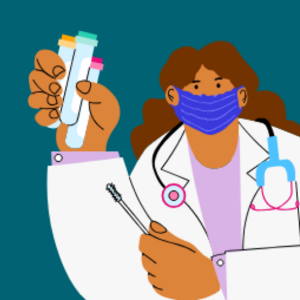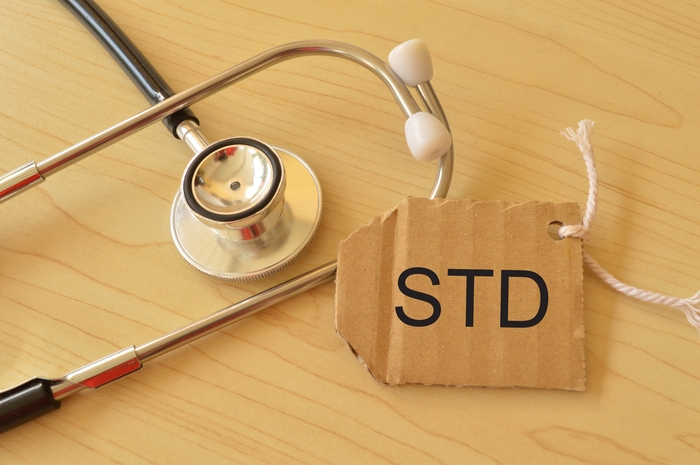
Ensure your health. Get tested today.
Convenient lab testing at your fingertips at more than 5,000 locations nationally. Consult with a doctor, or get tested on your own.

Sexually transmitted diseases, also known as STDs, can affect anyone who is sexually active. Unfortunately, STDs are very common, and they are on the rise in the US. In fact, according to the most recent report from the US Centers for Disease Control and Prevention (CDC), the number of reported STDs has reached an all-time high for six years in a row.
If you are sexually active, this information can feel intimidating. However, being informed about STD testing and the various types of STDs can help keep you safe and healthy. Read on for everything you need to know about STDs, and what to do.
An STD is an infection that is transmitted during a sexual activity. You don’t have to have sexual intercourse to get an STD—they can be passed along during other intimate activities, such as oral sex.
You may be wondering about the difference between an STD and STI. These two acronyms actually refer to the exact same condition. The term STI is an abbreviation for “sexually-transmitted infection,” which can refer to infections such as gonorrhea or chlamydia. While STD may be the term that is more commonly used and familiar, most health organizations in the US use the terms interchangeably.
It can be confusing to try to figure out which STD tests you may need. If you have had an unprotected sexual encounter, you may be curious to know which screening tests are recommended.
This STD guide is for people who are proactive about their health and want to keep themselves and their partners safe and free from disease. You may be under the impression that STDs are rare, however the US Centers for Disease Control and Prevention (CDC) reports that 1 in 5 people in the US have an STI.
When it comes to STD testing, there are various methods of lab testing available. The following table is a summary of some of the most common STIs in the United States, based on data from the the CDC, but there are others that your healthcare provider can screen for, as needed.
Sometimes, people may feel embarrassed about getting an STD test, or they may feel like there is a stigma around STD testing and STD treatment. Maybe you have been searching on the internet for how to get an STD test, what is STD, or STD testing near me, and you keep exiting out of the search window out of fear. People may feel shame about the process, or they may be nervous about communicating potential positive results to their partners. Many people may not get regular STD testing simply because they are unaware of the importance of regular testing, and they may not think that they are vulnerable to contracting an STD.
Getting an STD test can sometimes feel strange, and it’s understandable to be hesitant about getting tested. However, getting screened for STDs is one of the most important ways that you can be forward-thinking and proactive about your own health.
There are many misconceptions about STD screening that get in the way of accessing safe and affordable treatments. Here are a few of the more common misconceptions and guidance from the CDC :
If you have ever harbored one of these misconceptions about STD screening, you are not alone. However, these misconceptions can get in your way when it comes to seeking proper care.
If you have a positive STD test result, you can rest assured that there are many forms of effective treatment available, regardless of the nature of your infection. Your medical provider will confidentially discuss with you your treatment options. It is also generally recommended to discuss your positive test results with your sexual partners so that they can also receive treatment. This not only keeps them safe, too, but it often prevents you from getting reinfected after you have received an effective STD treatment.
If you have had a positive test result, it may also be important to determine whether or not you are pregnant. According to the CDC, some STDs can have a negative impact on a pregnancy and will need to be treated in a specific way. Some medications used to treat STDs can also impact pregnancy. It will also be important to share this information with your medical providers in the future, as some STDs can impact your goals of getting pregnant in the future.
An at-home STI test can provide you with the information that you need about a specific STI. Always check with your provider if you have questions about testing options. However, not all at-home STI tests are FDA-approved, and they may not cover all of the potential factors that a medical provider considers when you get an in-person STD test.
You know what it takes to stay healthy and to be proactive about seeking medical care. Screening for STDs is just one component of maintaining a healthy lifestyle and keeping yourself safe, particularly if you regularly have unprotected intercourse.
One of the best ways that you can practice safer sex is by using a barrier for protection with each sexual encounter. The CDC recommends a barrier such as a male condom, female condom, dental dam, or film, as methods that can give you peace of mind that you are doing everything you can to protect your health.
| STI | What is it? | How common is it? | What are the STD symptoms? | What are the risks? | Type of STD Test Available | Is it curable? |
|---|---|---|---|---|---|---|
| Chlamydia | Bacterial infection | Most frequently reported STI in the US, affecting 4 million people each year | Usually no symptoms, but some people experience discharge, itching, burning, or pelvic pain | Can be passed to baby during childbirth, can cause pelvic inflammatory disease, can impact future fertility | Urine test, penile or vaginal swab | Yes |
| Gonorrhea | Bacterial infection | There are 1.6 million new gonorrhea infections diagnosed each year | Sometimes no symptoms but some people may have irritation with urinating, or discharge | Can be passed to baby during childbirth, can cause pelvic inflammatory disease, can impact future fertility | Urine test, penile or vaginal swab | Yes |
| HIV | Viral Infection | 984,000 people in the US have HIV, with 32,600 people getting a new diagnosis each year | Usually no symptoms except for an initial flu-like illness | Can be passed to baby during pregnancy, childbirth, or breastfeeding. Can progress to life-threatening condition of AIDS | Blood test, cheek swab | No – but it can be reduced to an undetectable level with treatment |
| Syphilis | Bacterial infection | Syphilis affects 156,000 people in the US | Painless sores in the genital area, rectum, or mouth. Symptoms become more pronounced decades later after it has progressed | In its late stages, syphilis can cause permanent damage to various organs, including the nervous system, heart and skin | Blood test | Yes |
| Hepatitis | Viral infection | About 850,000 people in the US are affected by Hepatitis B, and experts estimate there may be 2.4 million or more people living with Hepatitis C | Usually no symptoms until decades later | Can be passed to a child during childbirth, can cause long-term liver damage and make a person more vulnerable to liver cancer | Blood test | Hepatitis B is not curable but it can be managed with medications, Hepatitis C is usually curable with medication |
| HPV (Human papillomavirus) | Viral infection | HPV is the most common STI in the US, affecting 42.5 million people, with 13 million new diagnoses each year | Ranges from no symptoms to genital warts | Certain strains of HPV are associated with the development of cancer, especially cancer of the cervix, vulva, vagina, penis, anus, mouth, or throat | Cervical swab | No, however there are treatments for the health problems associated with HPV |
| Herpes | Viral infection | Herpes simplex virus 3 (HSV-2) is the second-most common STI in the US, affecting 18.6 million people | Painful blisters that may go undetected | Can make a person more vulnerable to other STDs, can be spread to a baby during childbirth and cause serious complications, can rare brain inflammation | Local swab, blood test | No, however flares can be managed with medication |
STD and STI refer to the same condition. They are used interchangeably by health organizations.
Anyone who is sexually active should consider getting tested for STDs, as they are common and can affect anyone.
Some misconceptions include the belief that STDs are rare, that testing is painful, and that a negative test means you are not infected.
If you test positive, your healthcare provider will discuss treatment options with you. Many STDs are curable and can be managed with treatment.
While at-home STI tests can provide valuable information, not all are FDA-approved and they may not cover all factors considered in an in-person test. Always consult with your healthcare provider.
There are a number of ways of getting an STD test. You may be asked to provide a urine sample, or you may need to have a swab sample taken of the body region in question. Some STDs can only be detected by blood, so you may need to have a blood test. Regardless of the method, STD tests are often quick, convenient and pain-free.
The time period that you have to wait for an STD result varies depending on the test. Some rapid tests provide a result within an hour. However, some tests may take a few days to return a result. After getting an STD test, the CDC recommends to avoid sexual intercourse until you know your results. This way you can help keep your partners safe until you know your STD status.
The price of an STD test varies according to the type of test. Some tests, like a blood test, may be more expensive, as they typically require a trained professional to obtain blood through puncturing a vein. Other rapid tests like swabs or dips that evaluate a urine sample, may be less expensive.
There are a number of places to get an STD test. One of the most efficient, convenient, and affordable ways is by visiting a local convenient care location, or by scheduling a virtual visit. At Solv, we offer telemedicine services and have urgent care locations nationwide. Our experts provide high quality care that can give you peace of mind that you are taking the best possible care of your health.
STD testing costs can vary depending on the type of evaluation you are receiving. They can range from under $100 to a couple hundred dollars. Testing for more than one STD is generally more expensive. If you have health insurance, your insurance provider may cover the cost of an STD test.

Convenient lab testing at your fingertips at more than 5,000 locations nationally. Consult with a doctor, or get tested on your own.